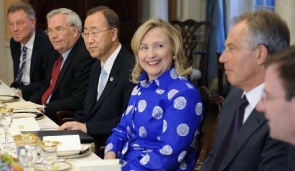UPDATES
“Jewish State” a sticking point for Quartet
July 13, 2011 | Daniel Meyerowitz-Katz

The Middle East Quartet (the UN, the US, the EU and Russia) concluded a high-level meeting yesterday, aimed at re-starting Israeli/Palestinian peace talks, without agreeing on a concluding statement. As Barak Ravid reported for Haaretz, the disagreement was over whether or not the Quartet could demand that the Palestinians recognise Israel as a Jewish State.
“The goal was to give each side something that was important to them,” a Western diplomat said. “The Palestinians were supposed to get 1967 borders with land swaps and the Israelis wanted to receive in return the recognition of Israel as the Jewish homeland, but there was no agreement on this matter.”
A senior Israeli official said that Russian Foreign Minister Sergei Lavrov took mostly pro-Palestinians positions in the Quartet talks and would not allow the inclusion of Israel as a Jewish and democratic state in the concluding statement of the meeting.
Despite describing the two-and-a-half-hour long meeting as “excellent,” the foreign ministers of the Quartet separated on Sunday without issuing a shared statement.
The above quotation illustrates the disparity in international policy towards Israel and the Palestinians. All too often, international mediators are willing to impose conditions on Israel – such as the 1967 borders – while refusing to demand any concessions from the Palestinians or to hold them to account. This creates a situation where the Palestinian Authority can believe that it does not need to move forward in the peace process and can rather sit back and watch and enjoy the circus of condemnations on Israel.
The idea that Israel is a Jewish state and should be recognised as such should really not be controversial. Israel was founded on the basis of UN General Assembly Resolution 181, passed in 1947, which very clearly called for “independent Arab and Jewish States” in what was then “British Mandate Palestine”. As I wrote here, the Palestinian refusal to recognise this has to do with an unfortunate history of rejecting any Jewish claim to the land and a denial of Jewish national identity.
As three of the four Quartet members realise, the acceptance of Israel as a Jewish state is an imperative of the idea of “two states for two peoples”. While it is not at all clear why Russia is choosing to obstruct this demand, one can only assume that Moscow sees some diplomatic benefit in stalling the peace process – perhaps the ongoing impasse serves as a distraction from Russian efforts to re-assert itself as a significant power in the region, or perhaps it is an attempt to distance itself from Washington. Whatever the reason, teh fact that Russia would put its interests ahead of a peaceful resolution to the conflict does not bode well for the future.
Tags: Anti-Zionism





